Have you ever thought that you organic waste could be useful as a resource and not just a waste? With new technology adapted to lover scale home use it can. An Israeli startup HomeBiogas has developed an affordable and compact anaerobic digester that converts organic waste into cooking gas and liquid fertilizer. Technology was already used by large-scale biogas power plants but they managed to advance the technology to put it in micro scale level which can be used for household use. As the founders of the company say it “offers the most advanced, compact and cost-effective Biogas systems that convert kitchen waste and animal manure into cooking gas and liquid fertilizer, while maintaining the highest safety and health standards”.
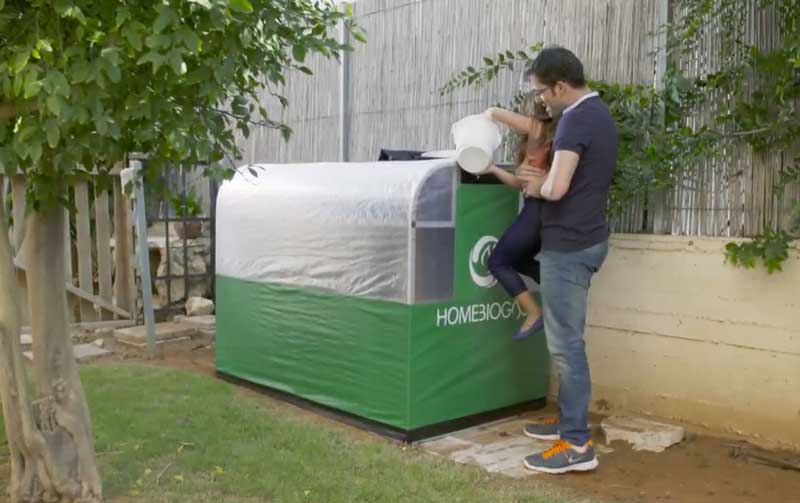
Biogas is a renewable fuel that is produced by decomposition of organic matter in an environment absent of oxygen. It is made up of several gases, primarily methane (CH4) and carbon dioxide (CO2), which can be stored and directed for cooking. HomeBiogas maintains a closed-loop eco-cycle: organic waste turns into energy and a liquid fertilizer byproduct which enables us to produce more food thus maintaining the critical cycle of life. Know exactly where your energy is coming from and where it’s going.
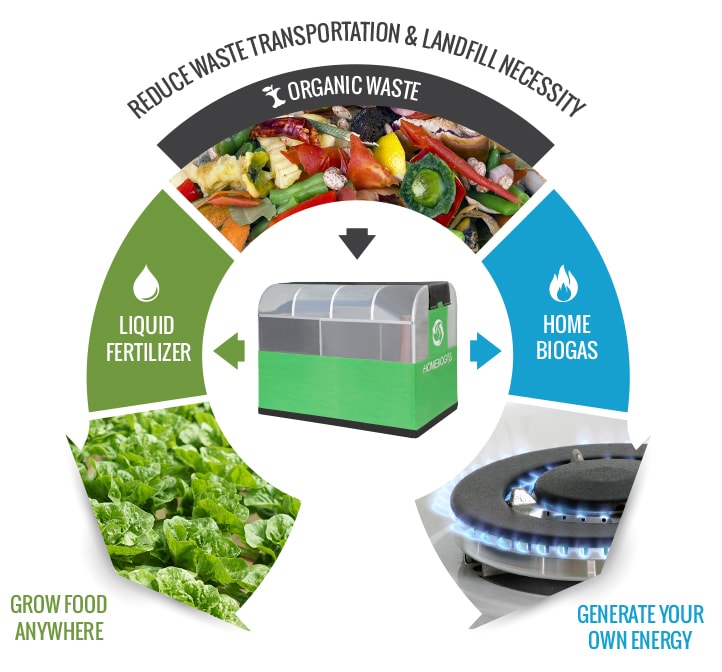
How does it work?
The input resource which Homebiogas uses is organic waste such as food scraps, kitchen trash and pet manure which is fed into the system and decomposed by microorganisms to the biodegradable material in the absence of oxygen. The system’s principle of operation begins when organic matter is fed into the digester tank, which has been filled with water. The anaerobic bacteria in the water biodegrade the matter and digest it. Biogas is created during the fermentation process. The system operates as a continuous-flow system.
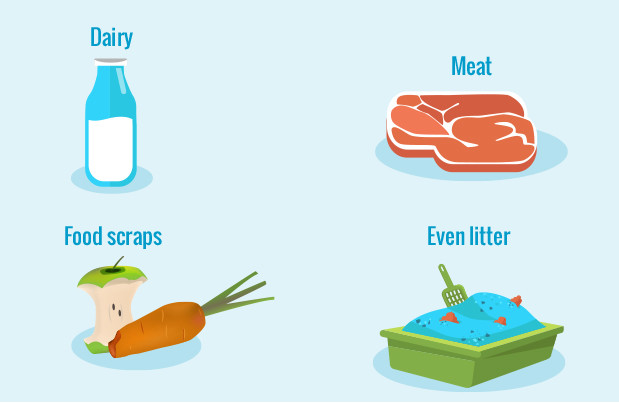
The materials to be processed are fed in one end, and the gas and fertilizer are emitted from the other end. A mechanical mechanism unique to this unit regulates the gas pressure, enabling the gas to be delivered at a stable and predictable pressure, as required for reliable cooking or heating.

After the process the end product is clean biogas (approx. 65% CH4 , 35% CO2) which can be used for cooking, lighting or heating water by using devices which are compatible with low pressure biogas and biofertilizer which can be used in gardens or for other vegetation, including hydroponic systems with detached beds.
According to the company information the Homebiogas can use up to 6 liters (6 qt) of food waste or up to 15 liters (15 qt) of animal manure per day. Every liter of food waste produces about 200 liters of gas, or the amount needed to cooking over a high flame for one half hour. On average HomeBiogas is daily producing clean cooking gas for 3 meals and 10 liters of clean natural liquid fertilizer.
The built in tank stores 400 liters of gas. Any additional gas generated by the system is automatically released and dissipates into the atmosphere.
Technical details
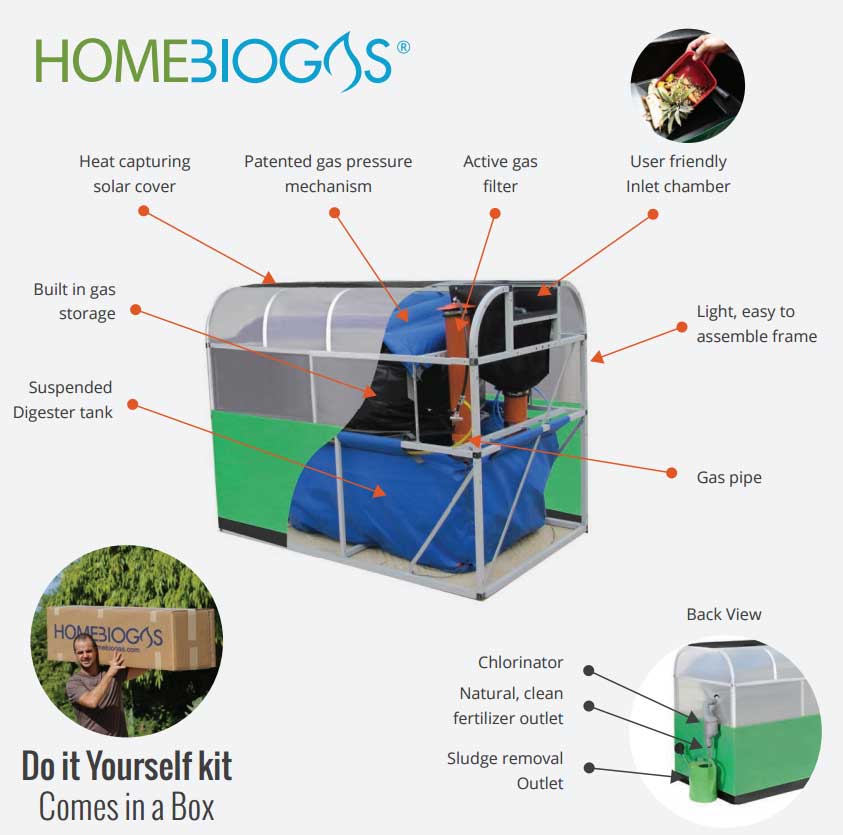
What can be digested per day:
- Up to 6 liter (qt) of food waste or
- Up to 15 liter (qt) of animal manure
Output gas:
- Clean biogas (approx. 65% CH4 , 35% CO2)
- nominally 600 liters (3+ hours of cooking)
Fertilizer:
- Treated natural liquid fertilizer
Nominal gas pressure:
- 15 miliBar
Temperature (day/night average):
- Above 17ºc. (66ºf.)
- for consistent Gas production
Weight (empty):
- less than 35kg, (77lbs)
Dimensions:
- 127H/165L/100W cm, (51”x65”x40”)
Who is HomeBiogas for?
- HomeBiogas is perfect for all sized families. It is not meant for industrial use such as hotels or big restaurants.
- Eco-villages, community centers, and educational organizations.
- HomeBiogas is a great environmental educational tool. It’s permaculture in action! Ideal for farms as well as centers with small-scale animal husbandry, animal breeders, and other animal owners.
- HomeBiogas can also be used in an urban environment located on rooftops.
Why should you consider buying it?
If you are an environmentally conscious consumer the HomeBiogas could be the thing for you. The company estimates that each year, the device eliminates one ton of organic waste and reduces the equivalent of six tons of carbon dioxide per one household which could make your household a carbon dioxide neutral. By using HomeBiogas you can offset your car’s carbon emissions which means that each year you use HomeBiogas you are reversing the hazardous greenhouse gases that your car emits. This seems like an environmental no-brainer.
By significantly reducing the damage caused by untreated organic waste, including air pollution, water contamination and the use of fossil fuels for energy, HomeBiogas systems respond to some of our most pressing environmental challenges today. Not only does it reduce landfill waste and pollution, it’s a renewable and local energy source which can save money on fuel at the same time. As Erez Lancer, one of the co-founders says: “One of the major issues today around the world is waste management. Imagine being able to treat your own waste [and consume] the gas it creates.”
The developers have posted a Indiegogo campaign and reached their goal $100,000 in less than 24 hours and totaled $232,748 by the end of the campaign.
To get further info on the biogas production or details how to make your own biogas digester you can check the following literature:
>
RECOMMENDATIONS




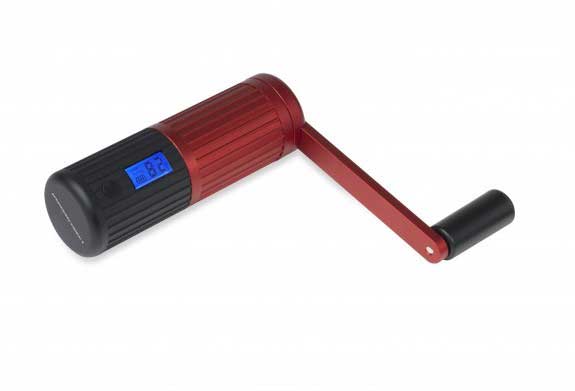
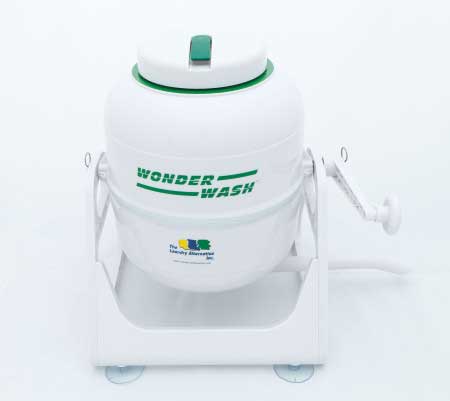
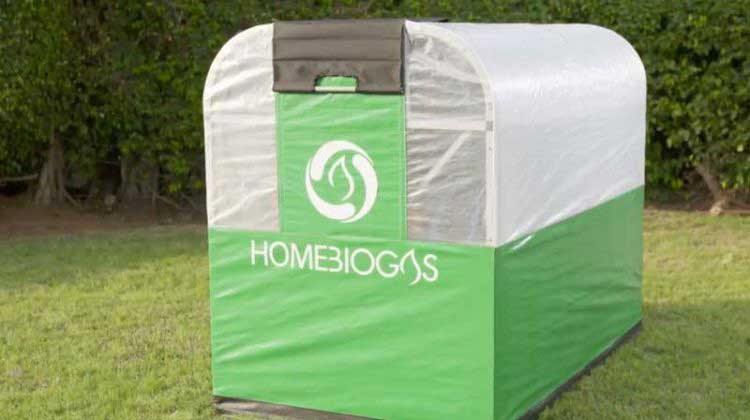

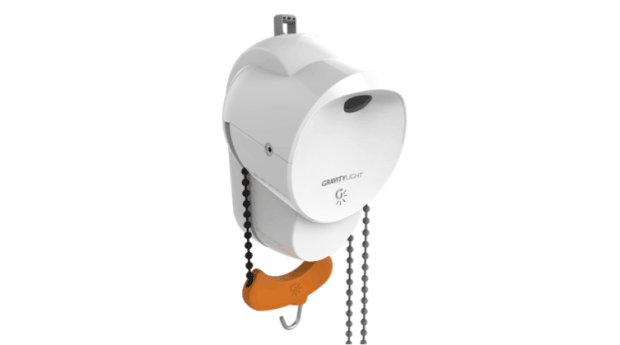

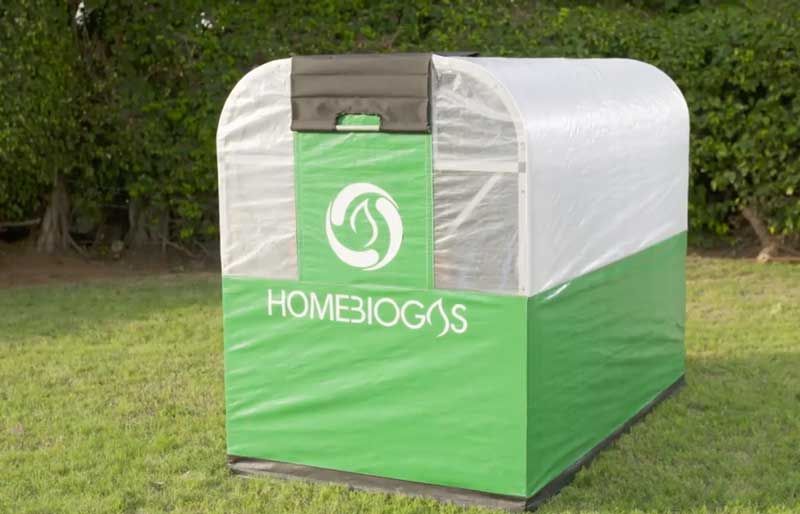

Dear Sir,
My names are Chinedu Nwafor presently Executive Assistant to the governor of Enugu state Nigeria.The state government wants
through her poverty alleviation and food security programme through your assistance to help set up domestic waste recycling
plants thereby increasing the (G.D.P) of the state and reduce unemployment and employ women and youths Conclusively.
Due to economic situation of Nigeria and the fall in oil price the state is looking for organizations,investors or agencies
that will partner with her to turn waste to wealth in the state in form of PPP: public, private partnership to help develop
domestic waste recycling plant into manure,cooking gas and other products for the state, supporting the United nations
program on Land Degradation neutrality to get arable land for farming the state will like to generate organic manure for
farming and completely turn her domestic waste into wealth.
Kind Regards
Hon Chinedu Nwafor
Executive Assistant to The Governor of Enugu State
Nigeria
Dear Chinedu Nwafor,
That is great plan to attract private capital into development project, but I don’t think that HomeBiogas could be too small for such a purpose. Maybe you could contact the producer https://homebiogas.com/ to see if they offer some custom made turnkey solutions. Good luck with the project!